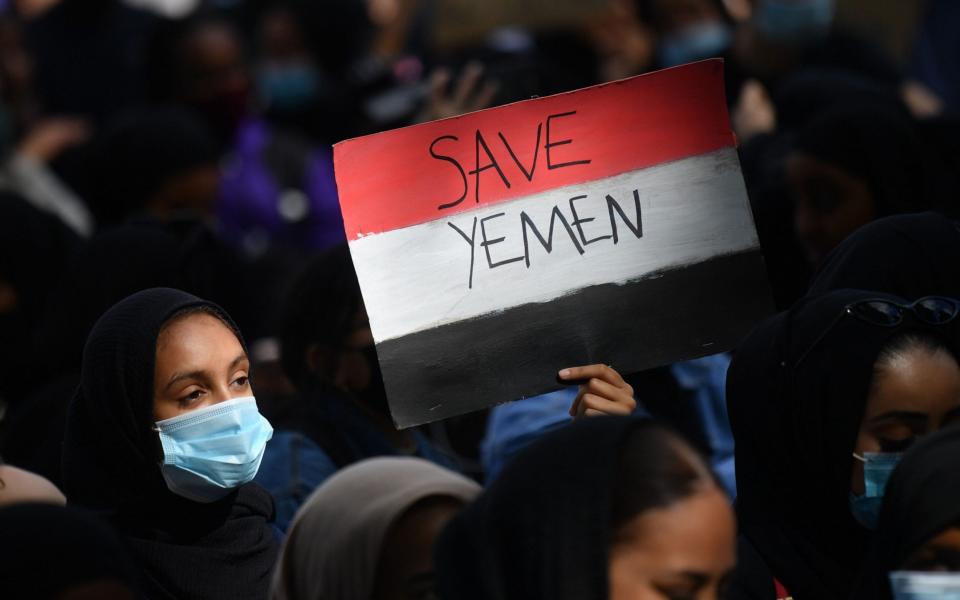UK to resume selling weapons to Saudi Arabia despite outcry over war in Yemen

The UK on Tuesday announced it will resume selling weapons to Saudi Arabia despite outcry over the human rights catastrophe in Yemen.
Liz Truss, the International Trade Secretary, said a fresh analysis of alleged violations of international humanitarian law (IHL) involving Saudi air strikes had concluded any breaches were "isolated incidents".
In a Commons written statement, Ms Truss said Riyadh had a "genuine intent" to comply with IHL and that military exports could therefore resume.
However the decision was condemned as "morally bankrupt" by campaigners whose legal action forced the Government to halt arms sales to the Saudis in June 2019.
Liam Fox, the international trade secretary at the time, announced the Government would not issue any new licences after the Court of Appeal ruled continuing sales would be unlawful.
It followed claims that Saudi warplanes fighting in the coalition against Iranian-backed Houthi rebels had repeatedly targeted civilian gatherings including weddings, funerals and markets.
In its judgment in 2019, the court said the Government had failed to make any concluded assessment of whether the Saudis and their allies had committed violation of IHL and had "made no attempt to do so".
According to the Government’s export licencing data, since the bombing of Yemen began in March 2015, the UK has licensed around £5.3 billion worth of arms to the Saudi regime.
Andrew Smith, Director of the Campaign Against Arms Trade (CAAT),cautioned that this figure was “conservative” as it did not include the Open Individual Export Licences, which enables unlimited transfer of predetermined military equipment over a fixed period.
“It’s an opaque system which has been used to shift extremely sensitive weaponry to the Saudi regime,” Mr Smith said.
Ms Truss’s statement said an analysis had been carried out of "all credible incidents of concern", and that while some had been assessed as "possible" violations of IHL, the analysis had not revealed any "patterns, trends or systemic weaknesses".
Mark Garnier, the newly appointed chairman of the Arms Export Controls committee, cautioned the “backlog of licence applications for Saudi Arabia and its coalition partners” cited by Ms Truss, which she said the Government would now begin to clear, which “has built up since 20 June last”.
He told The Daily Telegraph that the amount of applications in the “pending tray” could be “significant”, however added that if the Government “has consolidated with the criteria and has a robust way of scrutinising this, then at the end of the day they are entitled to do this”.
Tobias Ellwood, Chairman of the Defence Select Committee, added that if the UK did “return to selling arms it should be conditional on the UK having greater influence in the wider strategy to end the civil war that has dragged on for five years”.
Mr Ellwood told this newspaper that peace would “not be secured by dropping more (UK made) bombs from altitude - which is on the cards if a change in strategy is secured. We yield immense soft power in the region and should be less risk averse using it”.
Ms Truss’s announcement comes after the UK imposed sanctions on 20 Saudi nationals linked to the killing of the journalist Jamal Khashoggi.
Mr Smith, of CAAT, which brought the original case, added that Ms Truss’s statement was "rank hypocrisy", as he accused the Government of “supporting one of the most brutal dictatorships in the world”.
"This is a disgraceful and morally bankrupt decision," Andrew Smith, of CAAT said.
Mr Smith said lawyers for CAAT would now be looking at "all options" to challenge the decision. "The Saudi-led bombardment of Yemen has created the world's worst humanitarian crisis, and the Government itself admits that UK-made arms have played a central role in the bombing,” he said.
Denisa Delic, a spokesperson for Save the Children, added: “This decision is indefensible. Our Government say they want to be a ‘global force for good’. But today they decided that killing and injuring thousands of children in Yemen does not constitute a ‘pattern of harm’. The world’s most vulnerable children need action not words. They need protection, not more bombs."
Airwars, an investigative website that monitors civilian casualties in the Middle East, reacted with skepticism to the British government's findings on civilian deaths caused by the Saudi-led coalition.
This was because, Airwars claimed, the UK's own statistics on civilian casualties linked to Royal Air Force strikes were unreliable.
"The UK's own determinations of civilian harm from [RAF] airstrikes are not fit for purpose, as Airwars and others have repeatedly demonstrated. The UK claims, absurdly, just 1 civilian death from 4,400 anti-ISIS weapon releases over six years," Airwars said in a post on Twitter.
There was no immediate response from Saudi Arabia regarding the UK's decision on Tuesday, nor the kingdom's state news agency. The Telegraph has approached the Saudi government for comment.

